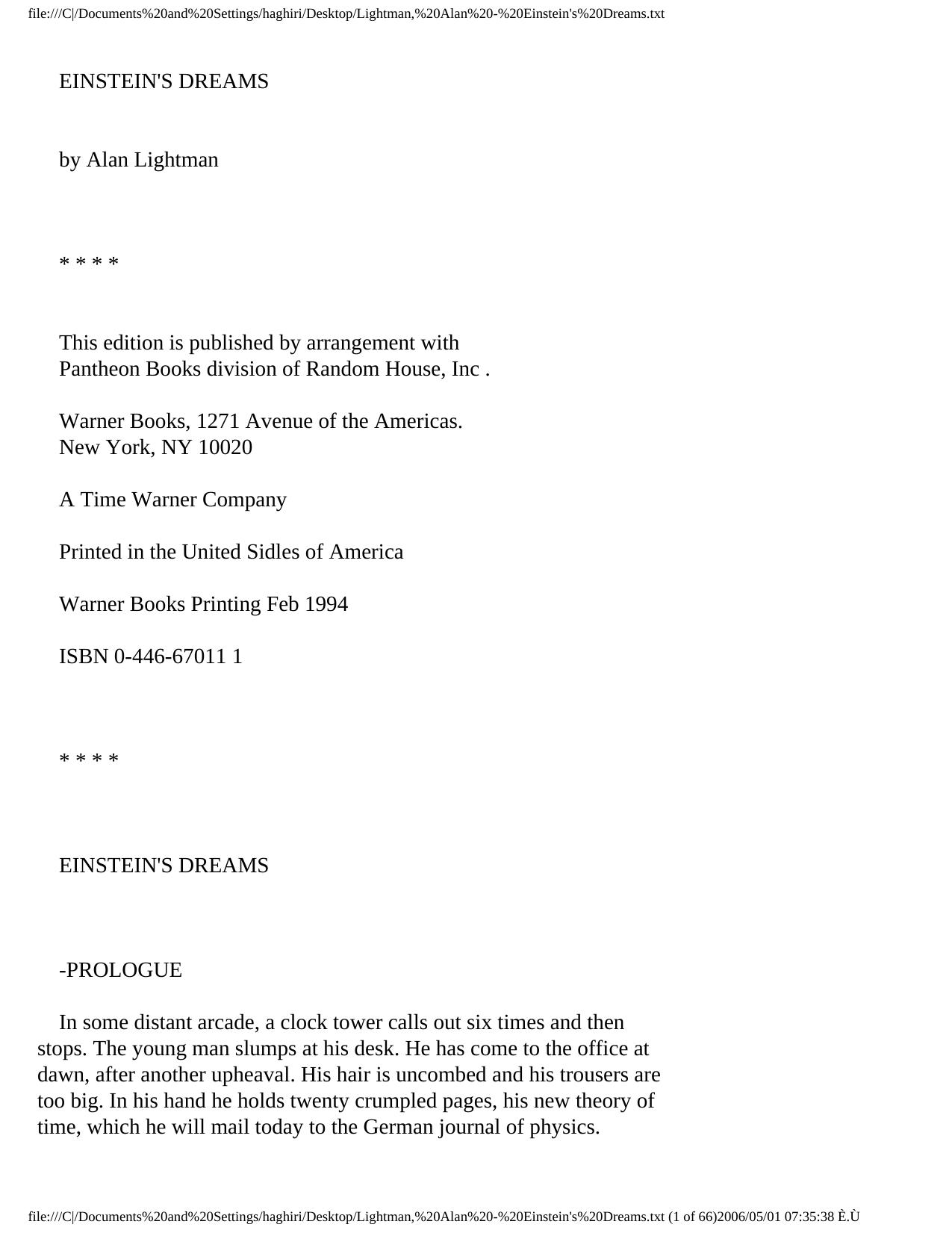Einstein's Dreams by Alan Lightman

Author:Alan Lightman [Lightman, Alan]
Language: eng
Format: epub, mobi, azw3, pdf
ISBN: 978-0-307-78974-7
Publisher: Knopf Doubleday Publishing Group
Published: 2011-03-01T16:00:00+00:00
• 29 May 1905
A man or a woman suddenly thrust into this world would have to dodge houses and buildings. For all is in motion. Houses and apartments, mounted on wheels, go careening through Bahnhofplatz and race through the narrows of Marktgasse, their occupants shouting from second-floor windows. The Post Bureau doesn’t remain on Postgasse, but flies through the city on rails, like a train. Nor does the Bundeshaus sit quietly on Bundesgasse. Everywhere the air whines and roars with the sound of motors and locomotion. When a person comes out of his front door at sunrise, he hits the ground running, catches up with his office building, hurries up and down flights of stairs, works at a desk propelled in circles, gallops home at the end of the day. No one sits under a tree with a book, no one gazes at the ripples on a pond, no one lies in thick grass in the country. No one is still.
Why such a fixation on speed? Because in this world time passes more slowly for people in motion. Thus everyone travels at high velocity, to gain time.
The speed effect was not noticed until the invention of the internal combustion engine and the beginnings of rapid transportation. On 8 September 1889, Mr. Randolph Whig of Surrey took his mother-in-law to London at high speed in his new motor car. To his delight, he arrived in half the expected time, a conversation having scarcely begun, and decided to look into the phenomenon. After his researches were published, no one went slowly again.
Since time is money, financial considerations alone dictate that each brokerage house, each manufacturing plant, each grocer’s shop constantly travel as rapidly as possible, to achieve advantage over their competitors. Such buildings are fitted with giant engines of propulsion and are never at rest. Their motors and crankshafts roar far more loudly than the equipment and people inside them.
Likewise, houses are sold not just on their size and design, but also on speed. For the faster a house travels, the more slowly the clocks tick inside and the more time available to its occupants. Depending on the speed, a person in a fast house could gain several minutes on his neighbors in a single day. This obsession with speed carries through the night, when valuable time could be lost, or gained, while asleep. At night, the streets are ablaze with lights, so that passing houses might avoid collisions, which are always fatal. At night, people dream of speed, of youth, of opportunity.
In this world of great speed, one fact has been only slowly appreciated. By logical tautology, the motional effect is all relative. Because when two people pass on the street, each perceives the other in motion, just as a man in a train perceives the trees to fly by his window. Consequently, when two people pass on the street, each sees the other’s time flow more slowly. Each sees the other gaining time. This reciprocity is maddening. More maddening still, the faster one travels past a neighbor, the faster the neighbor appears to be traveling.
Download
Einstein's Dreams by Alan Lightman.mobi
Einstein's Dreams by Alan Lightman.azw3
Einstein's Dreams by Alan Lightman.pdf
This site does not store any files on its server. We only index and link to content provided by other sites. Please contact the content providers to delete copyright contents if any and email us, we'll remove relevant links or contents immediately.
In Control (The City Series) by Crystal Serowka(36228)
The Wolf Sea (The Oathsworn Series, Book 2) by Low Robert(35249)
We Ride Upon Sticks by Quan Barry(34535)
Crowbone (The Oathsworn Series, Book 5) by Low Robert(33622)
The Book of Dreams (Saxon Series) by Severin Tim(33384)
The Daughters of Foxcote Manor by Eve Chase(23627)
Trainspotting by Irvine Welsh(21662)
Call Me by Your Name by André Aciman(20514)
The Secret History by Donna Tartt(19083)
Shot Through The Heart (Supernature Book 1) by Edwin James(18926)
All the Missing Girls by Megan Miranda(16023)
American King (New Camelot #3) by Sierra Simone(15885)
The Girl from the Opera House by Nancy Carson(15785)
Pimp by Iceberg Slim(14506)
Sad Girls by Lang Leav(14422)
The Betrayed by Graham Heather(12829)
The Betrayed by David Hosp(12791)
4 3 2 1: A Novel by Paul Auster(12391)
Still Me by Jojo Moyes(11265)
